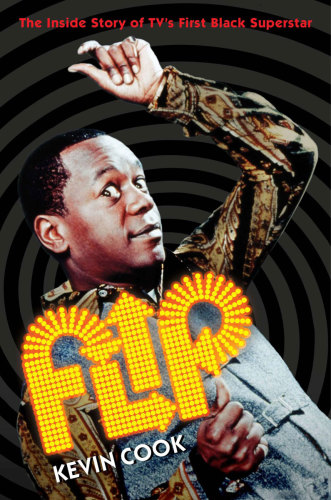
Flip
کتاب های مرتبط
- اطلاعات
- نقد و بررسی
- دیدگاه کاربران
نقد و بررسی

January 21, 2013
In the early 1970s, the phrases “The Devil made me do it!” and “What you see is what you get!” rolled easily off of people’s lips and entered our cultural vocabulary, thanks to a young black comedian named Flip Wilson. Drawing on interviews with family, friends, and Wilson’s colleagues, journalist Cook delivers a candid and entertaining look at Wilson’s meteoric rise from struggling stand-up comedian playing segregated nightclubs and bars on the Chitlin’ Circuit to his bursting onto the scene after several momentous appearances on the Johnny Carson Show, to Time magazine’s cover story on him as television’s first black superstar. Cook chronicles Wilson’s impoverished and abject childhood, when he was shuttled from foster family to foster family. Other topics include Wilson’s early memories of another comedian’s show-stopping performance, his escape from poverty into the military, and his own initial and wildly successful stand-up performances at his military base. Wilson’s ascent to the top of the television and comedy peaked in 1970 with The Flip Wilson Show, where on a given night, viewers might have found “B.B. King paired with Sid Caesar, or Andy Griffith paired with Curtis Mayfield.” Cook’s story also reveals a man vulnerable and unable to love deeply, as well as Wilson’s insecurities and his insatiable appetite for drugs. Cook’s fiercely honest biography captures the tumultuous and winning personality of the man who introduced many memorable characters to the world and who paved the way for black comedians such as Richard Pryor, Eddie Murphy, and Tyler Perry.

April 1, 2013
Journalist Cook (The Last Headbangers: NFL Football in the Rowdy, Reckless '70s, 2012, etc.) gives a largely forgotten TV pioneer his due. Raised in a brutal environment of poverty and abuse, New Jersey native Flip Wilson (1933-1988) became an overnight success in the 1970s as the first African-American host of a TV variety show but not before more than a decade of honing his comedy act in dives and nightclubs across the United States, creating routines and characters such as the legendary "Geraldine." Cook promises readers the "inside story," and he does not shy away from presenting the less-than-savory aspects of a life on the road and the stage. Wilson was driven to succeed from the start, and he did not hesitate to clean up his nightclub act for a wider, and whiter, TV audience. He was able, however, to walk a line between comedians like the edgeless Bill Cosby, whose early crossover success both enraged and motivated Wilson, and the unpredictable Richard Pryor, who clearly learned valuable lessons on how to make it big from his time on Wilson's writing staff, alongside fellow future comedy legend George Carlin. Unlike those and others of the time, Wilson's work is mostly absent from the airwaves today, and Cook's readable narrative will hopefully go some way toward rectifying that situation. However, despite the book's level of detail, including some you-are-there creative license on the author's part, readers do not come away with a real appreciation for what made Wilson tick, beyond a desire to entertain and get rich. An entertaining and well-intentioned biography that lacks a deeper understanding of its subject.
COPYRIGHT(2013) Kirkus Reviews, ALL RIGHTS RESERVED.

March 15, 2013
Cook (The Last Headbangers: NFL Football in the Rowdy, Reckless '70s) traces the groundbreaking and ultimately heartbreaking career of Clerow "Flip" Wilson, the athlete TIME magazine called "TV's first black superstar." After an emotionally and physically scarring childhood and a stint in the Air Force, Wilson moved on to the African American-friendly performance venues known as the Chitlin' Circuit, where he took a scholarly approach to comedy. Successful television appearances (many on Johnny Carson's Tonight Show) led to The Flip Wilson Show, a wildly successful variety vehicle that allowed Wilson to spotlight both black and white entertainers. Despite his polished television performance, Wilson's life was rougher off camera. His family saw him mostly on television; the drugs that fueled his creativity also fed his paranoia; talent he launched, such as George Carlin and Richard Pryor, soon surpassed him with their edgier styles. VERDICT Cook crafts a personal and tragic biography, drawing from Wilson's unpublished writings and input from Wilson's son Kevin as well as his contemporaries, including Lily Tomlin and Gladys Knight. Cook also contextualizes Wilson's life against the racially charged atmosphere of the 1950s through the 1970s; this makes the book an important and recommended piece of African American history.--Terry Bosky, Palm Beach Cty. Lib. Syst., FL
Copyright 2013 Library Journal, LLC Used with permission.

March 1, 2013
What you see is what you get was one of comedian Flip Wilson's most famous lines. Delivered in drag as Geraldine, it was always funny, but it also reflected Wilson's policy of personal privacy. Most television viewers nationwide saw him as a happy soul akin to Bill Cosby, not a dangerous subversive, such as Dick Gregory or Red Foxx. His appeal was to all races. Forgotten was his early reliance on profanity-laced race material, and hidden were his sexual affairs and heavy use of marijuana and cocaine. In this frank but somewhat sympathetic biography, Cook recounts how the comedian constantly practiced his art through the 1950s and '60s and achieved his dream of fame in the early '70s only to be eclipsed soon after by younger, bolder comedians, including Richard Pryor and George Carlin. Though some readers may be offended by the language, this is a well-told story of a man desperate to succeed in the rapidly changing world of American entertainment.(Reprinted with permission of Booklist, copyright 2013, American Library Association.)

























دیدگاه کاربران